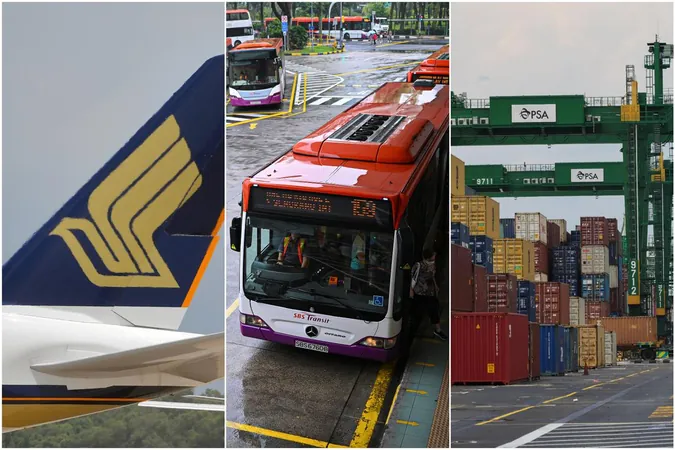
Major Overhaul for Singapore's Transport Sector: 19 Key Entities Under New Regulations
2025-04-03
Author: Mei
SINGAPORE – A significant regulatory shift is underway in Singapore's transport sector as the Transport Sector (Critical Firms) Act comes into effect on April 1, imposing tighter controls on 19 essential entities, including the national carrier Singapore Airlines (SIA), bus operator SBS Transit, and port operator PSA Corporation.
This new legislation empowers the government to exert greater oversight over crucial transport companies involved in air, land, and sea services, aiming to shield Singapore from potential disruptions and the influence of malicious actors. According to officials, the law is strategically designed to prepare the nation for extreme scenarios that could threaten vital transport functions.
The list of affected firms, published in the Government Gazette, includes 17 companies directly involved in delivering essential transport services within Singapore, alongside two entities that hold equity interests in key transport firms, thereby having a substantial say in decisions relevant to transport services.
Among the designated companies, the five operating in the land transport domain include SBS Transit Rail, SMRT TEL, SMRT Trains, as well as SBS Transit and SMRT Buses. In the aviation sector, nine entities have been earmarked, including the Changi Airport Group and various support and maintenance services associated with SIA and its budget counterpart, Scoot.
The maritime landscape features PSA Corporation, PSA Marine, and Jurong Port, ensuring comprehensive oversight across all transport modalities. Additionally, SMRT Corporation and PSA International are recognized as equity interest stakeholders in this regulatory framework, demonstrating the breadth of the law's reach.
Set to take effect on April 15, the law mandates that designated firms must notify relevant authorities and secure approval for significant ownership or leadership changes, including appointments of high-ranking officials such as CEOs and board directors. This aspect of the legislation underscores a proactive approach to safeguarding transport services from vulnerabilities.
Transport Minister Chee Hong Tat emphasized that the emergency powers granted through this law will only be activated as a last resort, with an existing dialogue expected between authorities and affected companies to navigate potential crises effectively. Should the need arise for intervention, the minister will appoint qualified individuals to manage the impacted entity to restore normalcy.
The enactment of this Act complements existing frameworks such as the Significant Investments Review Act, which scrutinizes major investments in sectors deemed critical to national security. The legal amendments were initially slated for late 2024 implementation; however, authorities stated that additional time was necessary to formulate subsidiary legislation.
In responses to the changes, both SIA and Scoot have affirmed their commitment to comply with the Act. Similarly, SMRT expressed full support, reflecting its position as a strategic public transport company dedicated to maintaining safety and reliability. SBS Transit also indicated it will align its operations with the new requirements, ensuring a collaborative effort with regulatory bodies.
As Singapore gears up for this critical transition, it stands as a testament to the nation's commitment to resilience and stability in its transport infrastructure, ready to tackle challenges while ensuring the safety and reliability of its services. With this compelling new legislation in place, stakeholders are poised to navigate the future of Singapore's transport sector with a renewed focus and determination.


 Brasil (PT)
Brasil (PT)
 Canada (EN)
Canada (EN)
 Chile (ES)
Chile (ES)
 Česko (CS)
Česko (CS)
 대한민국 (KO)
대한민국 (KO)
 España (ES)
España (ES)
 France (FR)
France (FR)
 Hong Kong (EN)
Hong Kong (EN)
 Italia (IT)
Italia (IT)
 日本 (JA)
日本 (JA)
 Magyarország (HU)
Magyarország (HU)
 Norge (NO)
Norge (NO)
 Polska (PL)
Polska (PL)
 Schweiz (DE)
Schweiz (DE)
 Singapore (EN)
Singapore (EN)
 Sverige (SV)
Sverige (SV)
 Suomi (FI)
Suomi (FI)
 Türkiye (TR)
Türkiye (TR)
 الإمارات العربية المتحدة (AR)
الإمارات العربية المتحدة (AR)